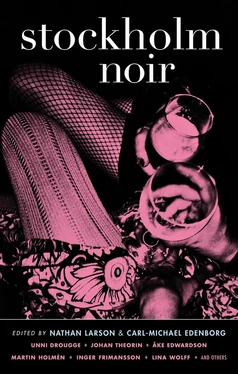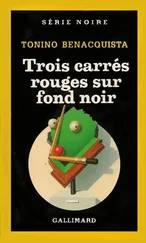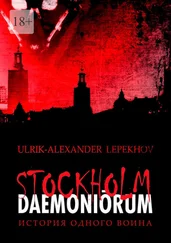Caroline Åberg - Stockholm Noir
Здесь есть возможность читать онлайн «Caroline Åberg - Stockholm Noir» весь текст электронной книги совершенно бесплатно (целиком полную версию без сокращений). В некоторых случаях можно слушать аудио, скачать через торрент в формате fb2 и присутствует краткое содержание. Город: New York, Год выпуска: 2016, ISBN: 2016, Издательство: Akashic Books, Жанр: Детектив, на английском языке. Описание произведения, (предисловие) а так же отзывы посетителей доступны на портале библиотеки ЛибКат.
- Название:Stockholm Noir
- Автор:
- Издательство:Akashic Books
- Жанр:
- Год:2016
- Город:New York
- ISBN:978-1-61775-297-1
- Рейтинг книги:3 / 5. Голосов: 1
-
Избранное:Добавить в избранное
- Отзывы:
-
Ваша оценка:
- 60
- 1
- 2
- 3
- 4
- 5
Stockholm Noir: краткое содержание, описание и аннотация
Предлагаем к чтению аннотацию, описание, краткое содержание или предисловие (зависит от того, что написал сам автор книги «Stockholm Noir»). Если вы не нашли необходимую информацию о книге — напишите в комментариях, мы постараемся отыскать её.
Copenhagen Noir
Helsinki Noir
Stockholm Noir — читать онлайн бесплатно полную книгу (весь текст) целиком
Ниже представлен текст книги, разбитый по страницам. Система сохранения места последней прочитанной страницы, позволяет с удобством читать онлайн бесплатно книгу «Stockholm Noir», без необходимости каждый раз заново искать на чём Вы остановились. Поставьте закладку, и сможете в любой момент перейти на страницу, на которой закончили чтение.
Интервал:
Закладка:
Thea lay her hand on Berit’s and her voice spoke softly.
— I saw your face when you caught sight of Rafel last night. But you must give up your dreams of winning him. You have to stop persecuting him.
— Persecuting? Berit inhaled, now more furious than ashamed. With flushed cheeks she stared down at the table and grabbed a corner of the red-checkered tablecloth. Wanting to jerk it away so that everything fell to the floor.
— Sorry if I’ve upset you; you must honestly be shocked by what you witnessed last night, Thea continued with her insufferable insight. Surely you wonder if Rafel has asked me to convey this to you, but first you need to understand the background. As you know, Rafel and I have been friends since we were very young and lived in a collective. He can seem sullen and tough but he’s a sensitive soul — which naturally is an attractive combination to everyone but himself. Through music he found an outlet for his vulnerability, but after the death at his last public performance he was terribly shocked. He feared his own power of attraction, thought that it was cursed. All the yearning fan mail from ragged kids didn’t help either — many of the letters had suicidal undertones and I didn’t know if I should forward them along to the police.
Now Berit understood why Rafel appeared so troubled after the incident. Thea said that the young woman who’d died at the old factory was really a stalker who’d harassed Rafel for years, drowned him with letters, and finally succeeded in ferreting out where he lived. Afterward she’d snuck around the area, on the lookout for her idol. Berit wondered why Rafel hadn’t reported the girl to the police, but then Thea explained that Rafel saw himself as a citizen of the world and loathed the authorities’ surveillance of people. To report a person to the police went against his strongest convictions; but now the cops were going through all of Hammarby with a fine-tooth comb, directing their abuse at those who’d chosen to live outside the system, which is why Rafel had asked Thea to give the voluminous fan mail from the dead girl to the police.
— So perhaps you understand, Thea concluded, that Rafel is terribly shaken by what’s happened. He needs to be alone and he can’t deal with any followers right now.
— You can tell him that he shouldn’t worry, Berit said brusquely, and got up. Besides, I never thought he was all that special.
Thea offered a maternal smile that lingered as Berit grimaced at her reflection in a nearby mirror. Her embarrassment was written all over her face.
The next day the suicide howled from the headlines, as the papers caught the scent of a “pop star.” While there was no commentary from the pop star himself, there were plenty of photos in the archives to run. Moreover, selections from the dead girl’s fan mail had been leaked to the media and were there in print, so every Tom, Dick, and Harry, as well as noted experts, could expatiate on this dangerous idol worship.
The following day the media machinery around Rafel and Cozmo Limited went into even higher gear. Hack journalists had uncovered another suicide that had taken place some years before, which could also be linked to Cozmo Limited. One of his songs was titled “Death Is a Friend,” and parallels were being drawn between it and the Werther effect. Rafel was no longer a “pop star,” now he was a “death star.” The two suicides were swept together with the accidental death at the concert. There was also a glut of new details about the earlier suicide. The girl had fallen from Skansbron, a drawbridge she’d clung to when it was raised, then lowered herself down into the narrow lock where she’d drowned. Both suicides had occurred in Rafel’s neighborhood, and both girls had written numerous fan letters to him. Both of them were outcasts and came from dysfunctional families with absent fathers and maladjusted mothers. They could have been Berit.
In the hunt for scapegoats, no culpability fell on either heredity or environment, rather on the death cult that was allegedly being marketed by Cozmo Limited. This caused various public figures to warn against the media’s anti-intellectual orientation and simplified reasoning which could establish breeding grounds for artistic censorship. Indeed, all the hullabaloo about the “death star’s” victims seemed to end with the question of artistic freedom. When no sexual infractions could be connected to the deaths, despite all the hype, the story lost its steam. Nevertheless, the record company was delighted when Cozmo Limited started climbing up the charts.
But Rafel consistently kept clear of publicity. It was Berit who sensed his presence — on the way home from work his car would glide alongside her for a stretch before he stepped on the gas and drove away; in the garden he snuck around like a fox. If Berit went strolling along the water below the stretch of woodland, he would unexpectedly step out of the little shipyard in his oilcloth coat and stop to watch her, as if she were a wild animal. And at night he wandered around in her dreams.
But then he disappeared, as if he were suddenly swallowed up by the earth, and only remained in the echo chamber of her mind.
One hazy Sunday afternoon Berit decided to resume her promenades on the wild side. She wrapped her long leather coat around her — the weather was unusually mild for this time of year, even though the deciduous trees’ naked shapes told of winter’s approach. She walked by the thermal power station, moved along the canal with swift steps, trembled a little when passing the shuttered lightbulb factory — she hadn’t set foot there since she’d seen the young woman pierced by the rusty iron bars. When she reached the flat slab of concrete she saw that it was covered with flowers, lanterns, stuffed animals, photos, sketches, and other expressions of love. A poster hung on one of the iron rods. A poem painted in graceful handwriting hung from it. Berit read:
Who were you?
A guest a thief
or the missing wing?
You came like light,
like fire, like a rush,
and said you were no one.
Now you’re the blues.
Now you’re dead.
Now you’re only an angel,
but my angel is death.
Death is my friend.
Bullshit, Berit thought as she marched toward the ghetto of small workshops — the place she’d first seen Rafel. The ground between the shacks was muddy, a clucking hen ambled around, farther away a mongrel was barking, and here and there came the clattering of tools and machines. Berit inhaled the peculiar mixture of smells — oil, gasoline, earth, marshy ground, garbage, and smoke. This was the way her father smelled when he’d surprised her outside school, before he’d disappeared for good. The only thing I can teach you is this: Always be on guard. Believe only what you see with your own eyes. That’s how he’d spoken, and Berit had tried to follow his advice. But he hadn’t explained anything about love or carnal knowledge. She tramped on, her pulse quickening.
Guitar notes pressed through the cacophony of welding irons, grinders, and sledgehammers. Berit was drawn toward the music — she wove her way along the oil drums, the tarps hanging on their lines, the sheet-metal hangars, and the barracks, until through the darkness and fog she caught sight of a brightly colored trailer beside a clump of trees. Lanterns shone softly from branches around the trailer. It was idyllic, like a fairy tale. The sound of the guitar was stronger now; a voice began to sing, a voice that was powerful and yet as soft as a caress. And there was Rafel sitting on a stepladder, singing to the red-violet trailer with bright green decorations that looked like snakes or plants with twining tendrils. Berit stopped ten meters away and listened.
Читать дальшеИнтервал:
Закладка:
Похожие книги на «Stockholm Noir»
Представляем Вашему вниманию похожие книги на «Stockholm Noir» списком для выбора. Мы отобрали схожую по названию и смыслу литературу в надежде предоставить читателям больше вариантов отыскать новые, интересные, ещё непрочитанные произведения.
Обсуждение, отзывы о книге «Stockholm Noir» и просто собственные мнения читателей. Оставьте ваши комментарии, напишите, что Вы думаете о произведении, его смысле или главных героях. Укажите что конкретно понравилось, а что нет, и почему Вы так считаете.












